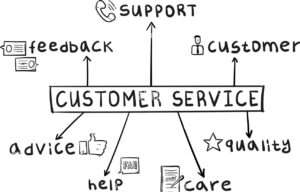
Welcome to the ultimate guide on how to provide exceptional customer service! In today’s competitive business landscape has become more crucial than ever. From small startups to multinational corporations, companies are realizing that satisfied customers are not just happy patrons but also loyal brand advocates.
Table of Contents
ToggleBut what exactly is customer service? Is it simply addressing inquiries and resolving complaints? Well, it’s so much more than that! Customer service encompasses every interaction between a company and its customers throughout their entire journey. It involves building relationships, anticipating needs, and going above and beyond expectations.
In this comprehensive guide, we will delve into the world of customer service and explore its inner workings. We’ll discuss why it plays such a pivotal role in business success, identify key components of good customer service, and reveal common mistakes you should avoid at all costs.
What is Customer Service?
Customer service is the backbone of any successful business. It refers to the support and assistance provided to customers before, during, and after their interactions with a company. It’s all about creating positive experiences that leave customers feeling satisfied and valued.
At its core, customer service is about meeting the needs and expectations of your customers. This can include answering questions, providing product information, helping with technical issues, resolving complaints or concerns, and even offering personalized recommendations.
The goal of customer service is to increase customer satisfaction and loyalty.
Remember, happy customers are not just repeat buyers, they are also more likely to refer others to your business.
How doe customer services work?

It’s a crucial aspect of any business that involves providing support and assistance to customers before, during, and after their purchase. Customer service is all about meeting the needs and expectations of customers by addressing their concerns, answering their questions, and resolving any issues they may have.
The first step in effective customer service is communication. Businesses need to be accessible to their customers through various channels such as phone calls, emails, live chat, or social media platforms. This allows customers to reach out with their inquiries or problems.
Once a customer reaches out for help, it’s important for the customer service representative to actively listen and understand the issue at hand. They should empathize with the customer’s situation and provide personalized solutions based on individual needs.
Representatives need to have a comprehensive understanding of the product and meet customer expectations. An uninformed representative could potentially damage the relationship between the customer and the company
Customer service can also involve providing product recommendations or additional information about services offered. This helps customers make informed decisions while demonstrating that the business values their satisfaction.
Finally, businesses should follow up with customers after their interactions to ensure their issues were resolved and to gather feedback. This not only shows that the business cares about the customer’s experience but also provides valuable insights for improvement.
Remember: Effective communication + Active listening + Personalized solutions = Exceptional customer service!
Why customer service is important?
The importance of customer service cannot be overstated, even though it may seem like a simple question. The goal of customer service isn’t just to provide support or resolve complaints, it’s to build relationships with customers and create exceptional experiences.
First and foremost, customer service plays a crucial role in maintaining customer satisfaction. When customers receive prompt and efficient assistance from your team, they are more likely to feel valued and appreciated. This leads to increased loyalty and repeat business.
Positive customer service experiences can also generate valuable word-of-mouth referrals as well. Satisfied customers are more likely to tell others about their positive experiences, which can significantly boost your brand’s reputation and attract new customers.
Through customer service, businesses gain feedback and gain insight into their products or services. By actively listening to customer concerns or suggestions, you can identify areas for improvement.
Furthermore, great customer service fosters strong relationships with existing customers, and happy customers will continue to choose your brand over that of your competitors.
Today’s competitive market, where consumers have numerous options, sets you apart from the competition by delivering exceptional customer service. By doing so, you demonstrate that you care more about your customers’ needs than mere transactions.
Investing in superior customer service results in enhanced customer satisfaction, increased loyalty and advocacy – all of which contribute to long-term success in a highly competitive environment.
What are key components of good customer service?

To provide exceptional customer service, several key components matter. These components not only contribute to a positive customer experience, they also contribute to long-term relationships.
First and foremost, effective communication is essential in delivering good customer service. This means actively listening to customers’ needs, concerns, and feedback, and responding in a clear and timely manner.
Whether it’s through phone calls, emails, or face-to-face interactions, being attentive and responsive shows customers that their voices are valued.
Another crucial component is empathy. Understanding the emotions and perspectives of customers allows you to provide personalized solutions that address their specific needs. By putting yourself in their shoes, you can demonstrate genuine care for their well-being.
Knowledge is also a key component of customer services. As a representative, you have comprehensive knowledge about the product or service. This will enable you to provide accurate answers and relevant recommendations or suggestions.
Customers appreciate dealing with knowledgeable representatives who provide valuable insights.
Another key component is Efficiency. Being efficient and respecting customers’ time is crucial in providing excellent customer service. Businesses that can quickly resolve issues or fulfill requests without unnecessary delays are highly valued by customers.
Consistency is essential in providing excellent customer service. Customers expect the same level of quality service regardless of which team member representative they interact with (over the phone, live chat, and email) or which location they visit. It’s crucial to maintain consistency to build trust and loyalty with customers.
Good examples of customer services
Good examples of customer service can be found in various industries and sectors. One industry that consistently excels in providing exceptional customer service is the hospitality industry. Hotels, resorts, and restaurants are known for going above and beyond to ensure their guests have a memorable experience.
For example, some hotels offer personalized welcome messages or gifts upon arrival, making guests feel valued and appreciated from the moment they step foot on the property. Additionally, staff members are often trained to anticipate guest needs and provide prompt assistance with any requests or concerns.
Another sector that stands out in terms of customer service is e-commerce. Companies like Amazon have set high standards by offering fast shipping options, hassle-free returns policies, and reliable customer support through multiple channels.
In addition to these examples, numerous small businesses prioritize excellent customer service. They may focus on building strong customer relationships by remembering their preferences or sending personalized follow-up emails after a purchase.
How to create a customer service strategy that delivers results?
Creating a customer service strategy that delivers results is crucial for any business looking to thrive in today’s competitive market. To develop a successful strategy, there are several key factors to consider.
First and foremost, it’s essential to define your company’s core values and how they align with your customers’ needs and expectations. This will serve as the foundation upon which you build your customer service approach.
Next, take the time to thoroughly understand your target audience. Conduct market research, gather feedback from existing customers, and use analytics tools to gain insights into their preferences, pain points, and communication preferences.
Once you have a clear understanding of your audience, providing multiple channels for customer service is a great way to ensure that customers can reach out to us in their preferred way.
It’s important to keep in mind that different demographics may have different communication preferences, so offering a variety of touchpoints such as phone support and live chat options can help streamline the customer service process and improve customer satisfaction.
Investing in technology solutions like CRM systems can help streamline processes while providing valuable data for analysis. Additionally, ensure proper training for all customer-facing staff members so they can effectively handle inquiries or complaints.
To truly set yourself apart from competitors when it comes to customer service excellence; go the extra mile by personalizing interactions whenever possible. Show empathy toward customers’ concerns and strive to exceed their expectations at every touchpoint.
Last but not least importantly – continuously monitor performance metrics such as response times or customer satisfaction ratings; this will allow you to make necessary adjustments and improvements along the way.
5 common customer services mistakes to avoid
As discussed earlier, customer service is a crucial aspect of any business, as it directly impacts customer satisfaction and loyalty. However, there are common mistakes that businesses often make when it comes to providing exceptional customer service.
By being aware of these mistakes and taking steps to avoid them, businesses can ensure they are delivering the best possible experience to their customers.
One common mistake is failing to listen actively to customers. It’s important to give your full attention and truly understand their needs or concerns. By listening attentively, you can provide appropriate solutions or alternatives that meet their expectations.
Another mistake is not resolving issues on time. Customers value prompt responses and quick resolution of their problems. Delayed responses can lead to frustration and dissatisfaction, which may result in losing valuable customers.
Inconsistent service can be detrimental to a business. Providing different experiences across channels or employees can confuse customers and negatively impact brand perception. To avoid this pitfall, it’s crucial to maintain consistency in service across all channels and employees.
Lack of personalization is also a common error made by businesses. Customers appreciate personalized interactions that make them feel valued as individuals rather than just another transaction.
Taking the time to address customers by name or offering tailored solutions based on their preferences goes a long way in building strong relationships.
Failing to follow up with customers after resolving an issue or completing a sale is a missed opportunity for businesses. Following up shows your commitment to customer satisfaction and gives you the chance to get feedback on how you can further improve your services.
By steering clear of these common mistakes, businesses can enhance their customer service efforts and create lasting relationships with happy and loyal customers.
Conclusion
Exceptional customer service is vital for business success, creating memorable experiences and fostering customer loyalty. This guide explored the importance of customer service, its key components, and examples of exceptional service.
However, it’s important to remember that achieving outstanding customer service doesn’t happen overnight. It requires careful planning and execution. Avoiding common mistakes like poor communication or neglecting feedback is crucial.
By developing a comprehensive customer service strategy tailored to your business’s unique needs and consistently improving your team’s skills through training programs, you can create an environment where exceptional customer support becomes second nature.
Remember, satisfied customers often become loyal advocates, spreading positive word-of-mouth about your brand. Invest in superior customer service today for long-term success.
FAQs
Customer service refers to support and assistance given before, during, and after customers purchase a product or service. It includes activities such as answering questions, resolving complaints, interacting with customers, following up on customer issues, and providing guidance and advice.
- Greeting the customer in a warm, personalized way.
- Prioritizing employee wellness.
- Remembering someone’s regular order as a barista.
- Sending out a survey after making a product change, to see what your customers really think.
Customer service is important because it can help a business differentiate itself from competitors, build loyalty with customers, and create a positive reputation
The three important qualities of customer service are professionalism, patience, and a “people-first” attitude.
While there isn’t a universally agreed-upon list of seven qualities, some important qualities often mentioned include empathy, good communication, problem-solving, patience, adaptability, knowledge of the product or service, and a positive attitude.
A customer service attitude refers to the mindset and approach of providing excellent service to customers. This includes a positive outlook, a willingness to help, and a commitment to ensuring customer satisfaction.
Key customer service skills include patience, problem-solving, flexibility, resourcefulness, empathy, and good communication.
Customer service excellence is often measured using key performance indicators (KPIs) such as Customer Satisfaction Score, customer feedback, survey, Net Promoter Score, Customer Retention Rate, Average Resolution Time, and Complaint Escalation Rate.
Good customer service can significantly impact a business by improving customer satisfaction, , increasing customer retention, generating positive word-of-mouth, and ultimately driving revenue. On the other hand, poor customer service can lead to customer dissatisfaction, loss of business, and damage to the company’s reputation.
The closing time of a Walmart customer service desk ranges from 8 pm to 10 pm, though the time may vary depending on the store.
The role of customer service is to interact with customers, answer their questions, process their orders, resolve their issues, and provide information about the company’s offerings. Its goal is to ensure customer satisfaction and loyalty.
Technology can enhance customer service by providing more channels for customer interaction, enabling faster response times, and allowing for more personalized service.
Key components of good customer service include empathy, responsiveness, knowledgeability, patience, and excellent communication skills.
Skills can be improved through training, practice, and feedback.


